I’ve been listening to a lot of classical music lately. …Ok. I’ve probably lost what few readers I have right there. Classical music isn’t exactly lighting up the charts these days (not that I have any idea what is lighting up the charts these days). People around me seem to care less about classical music every day. I’ve been informally polling the people I know and most of them don’t listen to classical music ever. Classical music isn’t funky. It doesn’t swing. It doesn’t rock. It doesn’t usually have a heavy, steady backbeat. It’s not great for 3 minute MP3’s on a playlist. The pieces are often kinda long. If you go see a classical concert, you’re supposed to stay quiet while they play the music. That’s a particularly tough one for a lot of people these days. Tickets to classical concerts are expensive (though most people in New York wouldn’t think twice about dropping that kind of money on dinner). Most of all, classical music is just an old art form. Orchestral music came from a long time ago and it seems a little remote to most of us these days.
I have to admit that I find the task of really getting to know classical music a little daunting. What am I going to know about classical music anyway? I’m not a trained musician. I’m an acoustic guitar and words guy. My songs are very simple. And there’s just so much classical music. Where do I start? When could I possibly even listen to much of it? I’m not familiar with half of the Stones’ records. When might I get to know Schubert’s 600+ songs? …600 songs?!? That’s just one guy! Maybe I should just start with his 9 symphonies. Getting to know 9 symphonies at least seems possible, particularly next to Haydn’s 100+ symphonies, or next to the catalog of a guy like Mozart. If you’re looking to get daunted by what you don’t know, just look on Wikipedia at a list of the works written by Mozart. The dude wrote over 60 symphonies alone and he wasn’t even really famous for his symphonies. I guess Mozart had a little extra time for symphony writing though. He didn’t die at 32 like Schubert. He lived to a ripe old 35. ..Yikes! Let’s look on the bright side: I’m pretty sure we’re not going to run out of classical music to listen to any time soon. A lot of people probably don’t even really know what classical music is, beyond it being the stuff with violins and cellos and orchestras led by conductors wearing tuxedos and waving batons. They might know that it started in Europe with those wig, ruffle and buckle shoe guys that made the music you hear in costume dramas. But there’s also that peculiar, noisy, more recent abstract stuff that people call classical music too. So we’re talking about a couple/three hundred years of music and roughly 1.3 zillion pieces we’ve never heard of. Ok. …Where do we start? …How ’bout by just listening? 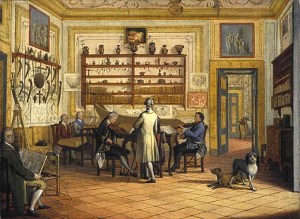

Remember the feeling as a child
when you woke up and morning smiled
it’s time you felt like you did then
I had the very good fortune of getting to listen to a lot of different music in the first few years of my life, before I knew what any of it was. My parents would put records on in the living room or put tapes on in the car and I would just sit and listen to whatever they put on, letting my imagination go wherever it did. Later on I learned which records were the classical records and which were the pop ones, etc… At first, it was all just music and I was way into it. Some of the albums I loved from those early days: 

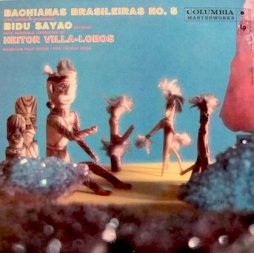



There were all kinds of dramatic moments in each of those records that I loved. I could make up my own story lines to go along with them. There were many beautiful and striking sounds. I loved the proud, strong, powerful brass. I loved the sneaky, spooky sound of plucked violins and cellos. I loved the soothing gentle reeds. I loved the wandering piano that could turn heavy and rumbling at any moment. Listening to an orchestra felt like swimming in an ocean of sound. Deep within the vast, expansive sea there were so many different things moving around near and far, all part of the same giant living organism. I can put those records on today and once again I’m swimming in that ocean of sound.
If you don’t know where to start with classical music, I recommend giving some child-like listening a shot. Try any piece of classical music. You can develop your own taste over time. For now, let yourself be liberated by what you don’t know. Dig the sounds. Learn about them later.
I’m painting my room in a colorful way
and when my mind is wandering
there I will go
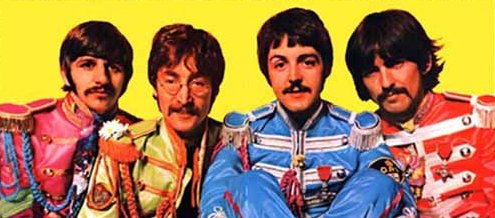
My folks’ classical records weren’t the only records that put me in touch with that expansive feeling. My good friends the Beatles had many wonderful soundscapes that were perfectly fascinating to my little boy ears in a similar way. As it turns out, classical music had a lot to do with those marvelous Beatles records too. The Beatles records were produced and often arranged by a man named George Martin, himself a classically trained musician. Martin had started his professional recording career as an engineer of classical records. He went on to produce stacks of top selling British comedy records before signing the Beatles and busting into the pop and rock music field for a few decades. To everything he produced, Martin brought a classical sensibility. He wrote an excellent memoir that I highly recommend:
I’m not so sure George Martin “created ” the Beatles, but he sure was good. In his book, he writes all about his education in music, the development of his recording techniques, the history of the music industry in England and the development of the stereo recording process. He also writes a whole bunch of anecdotes about working with the Beatles on some of the most enduring pop records ever. George Martin is great in interviews too. I love the way he talks. He as a very polite, gentle, old fashioned posh British accent. I recommend Youtubing an interview with him sometime.

George Martin in the studio with the Beatles
So what was this “classical sensibility” that George Martin and others like him brought to pop music? Well it doesn’t just mean that they added violins and horns and harpsichords to pop records. “Classical” music was a school of composing, arranging and presenting music. It was a movement of music theory and style that flourished in European cities in the 18th and early 19th century. Like any other “classical” art or architecture, classical music derives it’s aesthetic philosophy from the teachings of the ancient Greeks and Romans. The style was perhaps best exemplified in the works of Joseph Haydn and Wolfgang Mozart. I heard a rather clear definition of classical music yesterday in a lecture by Professor Robert Greenberg on the works of Hadyn. Said Greenberg… Classicism means balance: the perfect balance of melody, harmony, form and expression. The Classical ideal was music possessing memorable clear melodies; clear phrase structure and musical form (proportion); and emotional restraint (aesthetic purity).
The style we think of as “classical music” was worked up by these cats over a couple hundred years. Like the ancient Greeks and Romans they admired, they sought to create a a fine science of their aesthetics. They created teachable written theories of harmony, of counterpoint, of compositional structure, of instrument playing technique. Generations of musicians (first in Europe and then elsewhere) came up through the study and performance of this kind of music. Whenever they had to deal with the creation of a melodic line or the arrangement of a bunch of voices or a bunch of instruments, they were able to consult those couple hundred years of recorded theory. Later on, many composers of the 19th and 20th century would come to define their style by breaking the rules that classicism had established (Beethoven, Wagner, Stravinsky, Schoenberg, Ives, Cage, as big examples). But it was only as students of the classical school that they were able to rebel against it.
In the 20th century, there were still many people working in professional music and music recording who had learned classical technique and theory first. There are still some today, though a whole lot fewer than there used to be. The classical sensibility was very helpful in the arrangement of all kinds of popular music. Classically trained cats were able to write very cool and original arrangements for big jazz bands and movie scores for example. Once multi-track recording and the stereo concept became a part of the record making process, the mixing of the tracks and the placement of the tracks within the stereo spectrum became a modern symphony of it’s own. The producers and engineers became modern conductors of the orchestra of recorded sounds. So when George Martin was given the task of arranging the various sounds in a Beatles recording, he approached it the way a classically trained musician might approach any piece of music. He sought to achieve that “balance of melody, harmony, form and expression” in the Beatles’ records. …I think that balance was achieved pretty darn well in those records!
Roll Over Beethoven
Let’s forget about classical music or any category for a minute. Whatever music we’re listening to, what do we like about it? 1.Hopefully there’s a really good tune or at a least a cool hook. 2.Hopefully there’s some really good playing. 3.Hopefully there are some very dynamic and enjoyable sounds. Now go back a few hundred years. If you came up with a good tune and you wanted to record it you had two choices: You could write it down in musical notation or you could pass it down orally in folk tradition. The latter was pretty much a game of telephone. So let’s say you had the desire and you had the wherewithal to learn notation and write down your ideas. If you wanted to make the equivalent of a multi-track recording, you would have write a piece for multiple voices or multiple instruments or both. When exactly all of those different voices made or didn’t make noise and how would be up to your composition and the way it was conducted. …A symphony or an orchestral piece was the high budget, major production record of it’s time. 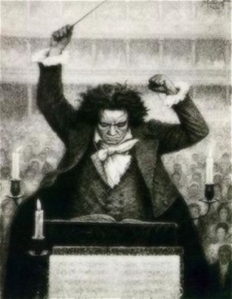
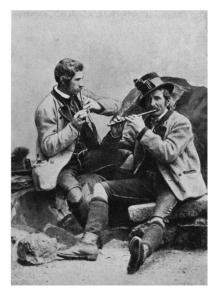
Classically Approaching a Hip Hop Garageband Solo Demo 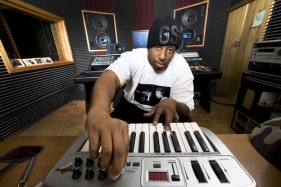
Let’s return to our home in the 21st Century. So now we’ve been many times sold the legend of the unschooled savant, the rugged individual and the power of all-mighty technology. So you’re way into that too. You’ve decided you’re going to be the guy doing everything now. You’ve got sound recording and editing software for your computer. You’re going to write music and lyrics, sing all of the voices and play all of the instruments yourself on different tracks. Ok. good for you. This is your symphony. You’re Beethoven and his librettist and his conductor and his orchestra. How will all the sounds that you make interact? What kind of dynamics can you achieve in the course of your creation? How full can you make your musical environment? How interestingly can you make the performance of each voice that sings on your recording? How well can you balance your melodies with your harmonies, your form with your expression? These are still really good questions to ask yourself, even if you’ve never studied music at all. 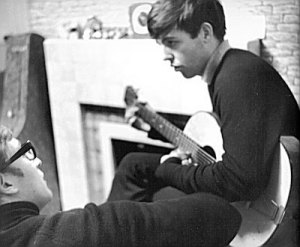
I Hear a Symphony
You don’t need classical training to make beautiful, meaningful, evocative music. There are plenty of examples of brilliant composers of song that never read a note (Irving Berlin and the Beatles come to mind). While those untrained guys have always given an ignoramus like me hope, I think it would be really dopey to dismiss the brilliant accomplishments of a few hundred years of intensive study. It would be equally as dopey to think that you need to be untrained to be original. Get to know the works of some of the most famous classically trained composers. I don’t think you’ll find them to be lacking in brilliance. And even if you never learn to play classical music, thinking classically even for an afternoon might just revolutionize your listening pleasure. Let your ears take in the symphony of all different arrangements of sound. It could be Berry Gordy and the greats of Motown in their giant explosion of hit pop records in the 60’s. It could be a bluegrass ensemble really getting a breakdown going, or a hip hop recording full of ingeniously layered tracks. Listen to Bach wander all over the organ in a toccata or to one of Mozart’s divas play her vocal register like a perfectly tuned horn. Open the doors of possibility. Take a swim in the ocean of music.

 “What countless impressions of a brighter, better life hast thou stamped upon our souls!” -Franz Schubert, to Mozart
“What countless impressions of a brighter, better life hast thou stamped upon our souls!” -Franz Schubert, to Mozart
Some of the pieces I was spinning while I wrote this:
J.S. Bach; The Goldberg Variations played by Daniel Barenboim
J.S. Bach; The Six Trio Sonatas for Organ played by Peter Hurford
J.S. Bach; Violin Concerto in A minor played by David Oistrach
Beethoven; The complete piano Sonatas, played by Artur Rubinstein
Beethoven; Septet, played by the Vienna Chamber Orchestra
Beethoven; the Nine Symphonies, conducted by Toscanini
Brahms; Clarinet Quintet played by members of the Cleveland Orchestra
Chausson; Concerto for Violin, Piano and String Quartet, played by Itzhak Perlman, Jorge Bolet and the Juliard String Quartet
Debussy; La Mer, played by George Szell and the Cleveland Orchestra
Haydn; The Farewell Symphony, played by the Vienna Philharmonic
Haydn; String Quartets op. 33, played by the Vienna String Quartet
Alan Hovhaness; Symphony Number 2
Mozart; Piano Concerto number 18 in B Flat, Rudolph Serkin and the London Symphony Orchestra
Ravel; Concerto in G major for piano and orchestra
Schubert; Lieder, sung by Dietrich Fischer Dachau
Stravinsky; Ebony Concerto and Symphony in Three Movements, played by the London Symphony Orchestra
Villa Lobos; works for Spanish Guitar played by Laurindo Almeida
…How ’bout you? Any favorite pieces of classical music? 

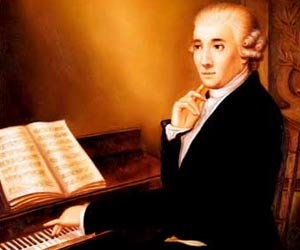
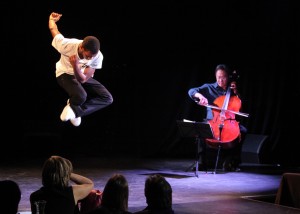
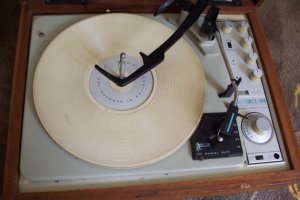







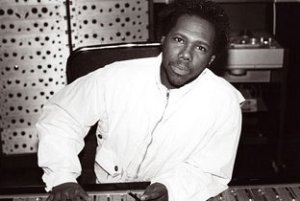
I sometimes get to listen to a classical station but am now turning to recordings of musicians I have seen in concert. Gil Shaham is the latest musician and his Bach cd is what is playing. Years ago I sat through a lecture on Bach and I have to admit that there is magic in those notes.
I’m crazy about Bach. I’m currently listening to a series of lectures on his life and work and reading a biography of the man. He’s a world of music unto himself. I’ll take a listen to Gil Shaham. Thanks for writing.
In the late 90s, I moved to a city out on Long Island which had an absolutely fabulous public library, including a huge CD section. My good lady wife had bought a Rough Guide to Classical music mini-book—100 CDs, I think—as a stocking stuffer for me on a whim, thanks to some clever placement at Barnes and Noble. I took the book and went to the library and checked out a few CDs at more or less random, knowing little more than a handful of Bach, Beethoven and Mozart pieces.
One of those CDs was Shostakovich’s Fifth, and I remember being stunned to what I was hearing. After having tried several times to get into classical, with mixed results, I discovered I just hadn’t heard the right stuff (for me) yet. I then spent the next three or four years listening to almost nothing but classical. It’s probably no more than 20% of my musical diet these days—which is to say, a fairly small but highly significant proportion. Sibelius, Nielsen, Vaughan Williams…oh my goodness.
If you haven’t heard Shostakovich’s 24 Preludes and Fugues for piano, I cannot recommend it highly enough—it’s the greatest piece for the piano written in the past 60 years, and for my money, is second only to Debussy’s piano work in terms of brilliance.
In the late 90s, I moved to a city out on Long Island which had an absolutely fabulous public library, including a huge CD section. My good lady wife had bought a Rough Guide to Classical music mini-book—100 CDs, I think—as a stocking stuffer for me on a whim, thanks to some clever placement at Barnes and Noble. I took the book and went to the library and checked out a few CDs at more or less random, knowing little more than a handful of Bach, Beethoven and Mozart pieces.
One of those CDs was Shostakovich’s Fifth, and I remember being stunned by what I was hearing. After having tried several times to get into classical, with mixed results, I discovered I just hadn’t heard the right stuff (for me) yet. I then spent the next three or four years listening to almost nothing but classical. It’s probably no more than 20% of my musical diet these days—which is to say, a fairly small but highly significant proportion. Sibelius, Nielsen, Vaughan Williams…oh my goodness.
If you haven’t heard Shostakovich’s 24 Preludes and Fugues for piano, I cannot recommend it highly enough—it’s the greatest piece for the piano written in the past 60 years, and for my money, is second only to Debussy’s piano work in terms of brilliance.
Thanks for your list Scott! I’m a huge fan of Debussy’s piano works and I recently got into Vaugh Williams. I’ve heard a few works by Shostakovich but I’ll definitely look up and listen to all of the works you recommended. Thanks again!
Milton